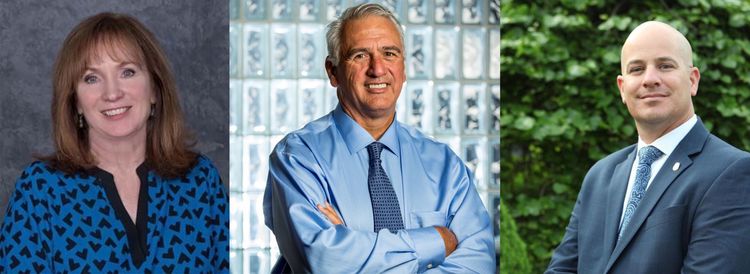Dr. Des O’Neill, of Tallaght Hospital and Trinity College Dublin, speaking in Orlando at the Annual Scientific Meeting of the Gerontological Society of America. PHOTO: PETER DERKX
By Peter McDermott
Some would say geriatrician Dr. Orla Sheehan is a specialist. She, however, regards herself a generalist.
“With all the specialties, you concentrate on one part of the patient,” she said. “Whereas with geriatrics you look after the whole patient. It’s not just their medical needs; it’s their social needs. It’s a real multi-disciplinary approach to patient care.”
The multi-disciplinary approach defines, too, the Annual Scientific Meeting of the Gerontological Society of America, at which the Dublin-raised and -educated Sheehan had just chaired a session about strokes. She was one of more than 4,000 GSA people attending the World Swan and Dolphin Resort in Orlando for the 3rd week of November.
The GSA’s principal mission, it says, is “to advance the study of aging and disseminate information among scientists, decision makers, and the general public.”
“This is a great meeting,” Sheehan said, “because the one thing it does is bring people together from all disciplines and everyone is on an equal footing to present from their perspective.”
[caption id="attachment_82061" align="alignnone" width="300"] 2orlasheehan
[/caption]
The 1945-founded organization says it “fosters collaboration between physicians, nurses, biologists, behavioral and social scientists, psychologists, social workers, economists, policy experts, those who study the humanities and arts, and many other scholars and researchers in aging.”
“GSA is probably the premier networking organization for researchers in aging,” said Dr. Des O’Neill of Tallaght Hospital and Trinity College Dublin. “The only other one that is comparable would be the Nordic Congress, which unites all the Nordic countries.”
The GSA describes itself as the “driving force behind advancing innovation in aging — both domestically and internationally. Its members come from more than 50 countries.”
Not least of those countries is Ireland, whose researchers, whether based at home or abroad, have an increasing profile in the work of the organization.
Sheehan moved two years ago from Dublin with her oncologist husband and pre-school children to work at Johns Hopkins University. The move to Baltimore, Md., was the second big relocation of her life. When she was 4, her family moved from Cork to the capital and she grew up in the northerly suburb of Sutton. After medical school at University College Dublin, Sheehan worked at the Mater, Beaumount and Blanchardstown Hospitals, and also continued her studies with a PhD in stroke medicine.
Sheehan pursues “three or four” areas of research, most of it based on clinical work. One, she said, looks “at the burden on the person caring for the stroke victim – whether they find it a positive or negative experience and how it affects their health.”
Dr. Rónán O'Caoimh is another young Irish researcher who followed up an MD with a PhD. He trained and works as a geriatrician at the Center for Gerontology and Rehabilitation at University College Cork.
“As a department, we presented a number of papers this week,” he said in Orlando.
The research findings revealed at one symposium involved international collaboration. “We’ve been working with colleagues in Spain, Portugal, Northern Ireland and Australia,” O’Caoimh said.
Generally, the UCC center has been associated with end-of-life care. “Prof. [David] Molloy has been working on that over the years,” he said.
“We’ve developed an integrated health-care pathway in Cork that we’ve been researching,” he added.
His own post-doctoral area of study is dementia care and he was about to present a paper on that when interviewed.
[caption id="attachment_82063" align="alignnone" width="300"]
[/caption]“It’s a good experience,” O’Caoimh said of his first-time at a GSA meeting.
Dr. Rozalyn Anderson is one Irish person with a rather longer track record at GSA. She first began attending the meeting when she was doing her post-doctoral studies at Harvard Medical School. The biologist from Dalkey, Co. Dublin, is now at the Department of Medicine, University of Wisconsin.
Anderson is a GSA Fellow, a status that acknowledges both the researcher’s scientific achievements and also her dedicated service to the organization. In the case of the latter, it includes her five years so far on the GSA’s task force on minority issues in aging.
“GSA has given me great opportunity for exposure, but also for contribution in that arena,” Anderson said.
Her scientific work is in the biology of aging.
[caption id="attachment_82064" align="alignnone" width="300"]
[/caption]“I’ve been studying caloric restriction, which is a dietary intervention that delays aging and the onset of age-associated disease,” said Anderson, who lives with her husband and children in Madison.
“I’m lucky enough to be part of one of the big monkey caloric-restriction studies. It’s pretty high profile. We’re doing some great work looking at what’s happening as a function of age,” she said. “With CR, we can tease out what’s the underlying basis for improved resilience and protection against age-associated disease in terms of delay and onset, but also attenuated progression.”
After Anderson’s undergraduate degree at Trinity College, she got her biochemistry PhD studying under Prof. Geraldine Butler at UCD.
Opting for Harvard wasn’t a tough decision. “I was moving to the U.S. anyway, because my husband is from the U.S,” she said.
She has settled well in the Midwest, all the while making regular trips back to see her family in Dublin.
“For a European like me, it’s easy to be in Madison,” she said.
Anderson, who did a second post-doc, has in her years of research gone from “yeast to mice [and] from mice to monkeys.”
The results, she said, show “improvements in health and survival, indicating almost certainly that this is translatable to human health and human aging.”
And the good news seems to be that “very stringent restriction might not be necessary to get the benefits of caloric restriction.”
All of this raises the issue of translatability and applicability of ideas heard at GSA.
“That’s why I’ve been coming for years,” Anderson said. “Because it has all the disciplines at the one meeting, there’s an opportunity for crosstalk.”
Indeed, much of GSA’s business happens annually in the broad hallways of a major American convention center.
One morning in Orlando, Dr. Áine Ní Léime approached Prof. Eric Kingson, a nationally-renowned expert on Social Security based at Syracuse University, to ask him to speak at a panel late in the summer of 2016. His answer was a tentative “yes, if…” Kingson explained he would not have the time to commit if he won the June Democratic primary in the congressional race in his district.
[caption id="attachment_82065" align="alignnone" width="300"]
[/caption]Ní Léime works usually with the Irish Centre for Social Gerontology at the National University of Ireland, Galway, but is currently on a two-year EU Marie Curie fellowship, based at Case Western Reserve University in Cleveland.
Her post-doctoral work here is a comparative project on older workers in Ireland and the U.S., with a particular emphasis on the gender aspects.
“There’s a much longer history of working at an older age in the U.S. than there is in Ireland,” Ní Léime said.
For instance, in 2000, of those from age 55-64, slightly over a quarter of Irish women and slightly over half of American women were in the labor force. Ireland has since been catching up in that regard, but in the over-66 category it’s still only 5 percent, whereas it’s almost three times that in this country.
“I’m looking at extended working life, the way people have to work longer than they used to,” Ní Léime said.
She is studying, too, the differences between those in secure positions and those in more precarious low-paying jobs. On the latter group, she said: “It’s really difficult for them to get work and certainly to hold on to it if they’re sick.”
More generally, Ní Léime added, many careers – for example, those in health care and construction – are physically demanding and don’t lend themselves well to a longer working life.
Ireland, despite that, is phasing in an official retirement age of 68 by 2028.
“It’s an even steeper increase than here [in the U.S.],” the Louisburgh, Co. Mayo, native said. “It was presented as a fait accompli. It wasn’t debated.”
Her work asks if those Irish government policies should be modified and if some protections might be added.
In general, there’s a mix of influences in the two countries, with the EU’s being strong in Ireland. “There was equality legislation much earlier here in the U.S., but in Ireland there’s more protection for part-time workers and we’ve more maternity leave and that kind of thing,” she said.
Pension provision in Ireland is better, too, but there’s almost exactly the same pension gender gap, with both countries lagging behind most others in the industrialized West.
The Orlando meeting was Ní Léime’s fourth consecutive GSA annual meeting. On the previous occasions, she’d traveled from Ireland to San Diego, New Orleans, and Washington DC.
“There are a few others from Galway here,” she said about Orlando in 2015.
“It’s really important,” Ní Léime added about GSA.
She is chairperson of a new European network that can offer training programs and exchanges for early-career researchers in the U.S. “It gives me a chance to tell people about that and they can apply,” she said. “It’s been really good for me. It leads on to other things – other panels at other conferences.”
Ní Léime will likely continue to come to GSA meetings in future years, but will be living back home from February 2017, her two-year stint completed.
Michael Creedon, by way of contrast, came to America in 1964 and stayed. Born in Inchigeela, Co. Cork, the 2nd of 14 children, to parents who owned and ran local businesses, he studied for the priesthood at All Hallows College in Dublin. He was ordained for the Diocese of Richmond, serving for nine years in the Norfolk region. He took leave of absence in 1973 – and would eventually leave the priesthood and marry – to complete a master’s degree in social work and then a doctorate in social welfare, with a focus on gerontology, at the University of Maryland School of Social Work in 1979.
[caption id="attachment_82066" align="alignnone" width="300"]
“My commitment to older persons was nurtured in Ireland and strengthened by my service in the priesthood,” Creedon said.
Aside from his academic positions over four decades, his work has involved “projects with the governments of Ireland, Iceland and New Zealand, the European Foundation, and with White House and federal state and local bodies in the U.S. The combination of academic, government, non-profit and corporate service, has been central to my career.
"I continue to lecture regularly to federal employees on retirement," Creedon said, "and am conducting research with a colleague at Radford University on federal employee attitudes toward retirement."
He described the GSA’s Annual Scientific Meeting as “useful and enjoyable.” At GSA 2015, he said he met “with colleagues from Ireland, the UK, Germany and Canada, with whom I have worked on projects over the years. I also met with young students, and with professionals early in their careers, and discussed their interests and their work with them.”
Creedon added in an email: “GSA is an essential seed-bed for new ideas, new collaborations, but also for recognition of new challenges — the rise of technology everywhere and its potential threat to work opportunities for elders; the demise of defined benefit retirement in America and its impact on retirement finances; the challenge of life expectancy extension for informal and formal care systems; the burgeoning problem of elder financial abuse; the challenge of aging for China with the prospect ahead of 340 million residents over age 65, and the consequences for family-care of the one-child policy in recent years, etc.”
Yet another representative at Orlando with Cork origins was Dr. Mary Rose Day, who attended with her UCC colleague Professor Geraldine McCarthy.
Day’s current focus is self-neglect in older adults, which she described as “an emerging, pervasive, complex and challenging problem that has serious adverse implications such as increased mortality.”
[caption id="attachment_82067" align="alignnone" width="300"]
Day added: “The self-neglecters’ lives depict helplessness, fear, isolation, loss and disconnection from communities and families.”
Such cases, which community nurses and other health- and social-care professionals deal with on a daily basis, she said “can present significant demands and ethical challenges.”
Day’s presentation at GSA in November focused on work towards developing ways to measure self-neglect for clinical and research purposes.
“I participated in a three-country symposium on self-neglect with colleagues who will also write chapters for a textbook on self-neglect,” she said, “which will be developed over the next year.” Her UCC colleague McCarthy and Professor Joyce Fitzpatrick of Case Western will be her co-editors.
Dr. Tadhg Stapleton, an assistant professor at Trinity College Dublin, would describe that publishing project as something “that puts Irish research on the map.”
He said that “GSA provides a great opportunity for Irish researchers to present internationally and to present with researchers in the same area.”
Orlando was Stapleton’s second Annual Scientific Meeting. His first was in November 2012 in San Diego, when he presented the research for his occupational therapy PhD. The title of his paper then was: “Determining suitability to drive among people with stroke within an Irish context of practice.”
[caption id="attachment_82068" align="alignnone" width="300"] tadhg stapleton
[/caption]His message in 2015 was the need for a standardized test on suitability to drive. But there was an important proviso. “Standardized tests are good to guide us,” he said, “but they shouldn’t be used in isolation. Some people don’t do well on tests.”
Dr. O’Neill, Stapleton’s research colleague on this subject at Trinity, commented: “Are older people truly wiser? I would definitely think that older drivers are definitely wiser.”
O’Neill found the subject of wisdom coming up again and again at the 68th Annual Scientific Meeting both in the sessions and the informal discussions in the hallways.
“So, for example, a really interesting discussion arose about older jazz players,” he said.
One session looked at whether wisdom could be measured with a questionnaire or via vignettes.
At the GSA meeting, there are numerous sessions and other events going on any given time.
“The choice is almost daunting,” O’Neill said.
The same could be said each year about the Exhibit Hall, where universities, medical centers, publishers and many other types of organizations publicize their work.
But it is possible over the week to get around to all of the booths. On one visit to the Exhibit Hall, O’Neill encountered fellow Dubliner Orla Hayden, who is a research programmer for the Rand Corporation.
Hayden explained that the non-profit think-tank finds people that might use its Health and Retirement Survey, “a huge longitudinal data set that is one of the gold standards for studies on aging.”
She added: “We turn it into a data product that’s easier for researchers to use.
“We’re also promoting the American Life Panel – and that’s 6,000 people over the age of 18 who are surveyed at regular intervals,” Hayden said.
The Ballinteer native argued, too, for her adoptive city of more than 15 years as a destination for the Irish. “The sun is always shining,” she said of Los Angeles where she lives with her American-born husband and their children.
[caption id="attachment_82070" align="alignnone" width="240"]
O’Neill agreed. He and his wife, who have seven children, visited a close family member there.
Among the Tallaght Hospital man’s extensive travels are his more than a dozen trips to the GSA’s Annual Scientific Meeting. He, like Dr. Anderson, is a GSA Fellow. The geriatrician was cited in particular last year for his more than 300 peer-reviewed papers.
"It’s proving a really interesting test bed,” O’Neill said of the meeting. “What I’m really enjoying is the receptiveness here.”
He said that interdisciplinary research is a “maturing area where you’re actually willing to have your own discipline’s way of doing business questioned.”
The arts and aging, one of his special interests, “could be in the social sciences, it could be philosophy, it could be psychology.”
O’Neill, an Irish Times columnist and a blogger for the British Medical Journal, then reported about a discussion he chaired and spoke at.
“We just had a wonderful session about esthetic deprivation in health-care settings and the significance of interventions in art,” he said, “and particularly trying to avoid treating it like a medication where you give x amount of art and you get y amount of result.
“What it really is about is those of us who are not impaired by illness or disability can make our own esthetic choices – we go to the cinema, we turn on a CD, we don’t turn on a CD. We have pictures on our wall. We can arrange our apartment the way we like.”
O’Neill said: “We’re seeing in Ireland that research in aging is not just about health. It’s about how you live your life and it’s about how you experience it. So I think we’re lucky to have this range of researchers.
“It’s great to see the range of presentations from Irish presenters,” he said. “It’s not just Dublin-centric.”
And O’Neill, who worked for a number of years in England, added: “Among the diaspora are hopefully people that will either, if they stay [abroad], be a resource in terms of linkages or will come back with extra skills.”
This article was written with support from the Journalists in Aging Fellowships, a program of New America Media and the Gerontological Society of America, sponsored by the Silver Century Foundation.









